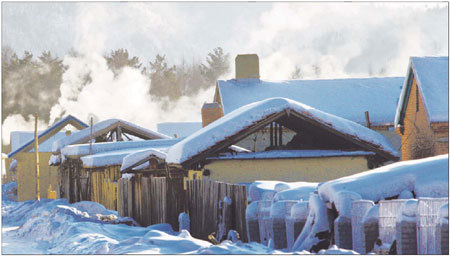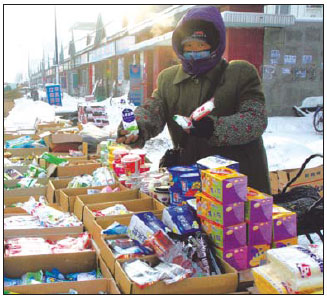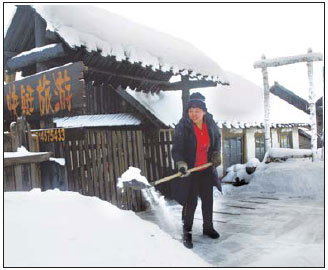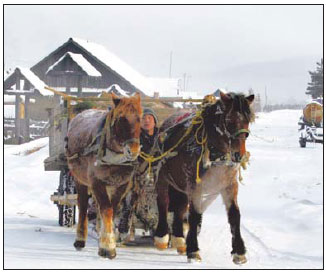Freeze! You're in Mohe
|
Chimney smoke rises from snow-covered cottages in Mohe county, known as "China's North Pole", in Heilongjiang province. Photos by Feng Yongbin / China Daily |
|
Ma Shuhuan runs an ice-cream stall in Mohe, which provides her family a better life than farming in her hometown in Inner Mongolia. |
|
Wen Mingjia owns a five-room family inn in Luoguhe village, located at the mouth of the Heilong River, marking the border with Russia. |
|
Sleighs are the most common means of transport for villagers in Luoguhe. |
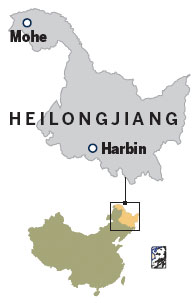
The coldest place in China is on the country's northern border with Russia and posted a record low one winter of -52.3 C. Tiffany Tan wraps up to find out more.
Imagine a place where snow blankets the earth for more than half the year, where -35 C is considered a "warm" winter day and where the sun begins its descent at 3 pm. Mohe county in Heilongjiang province is so cold you can feel icicles form around your nostrils with each breath, a car's fuel freezes after half an hour, and only fruits like wild blueberries have the temerity to grow in the ice-hardened soil.
Even so, China's northern frontier has a raw beauty that is matched by hardy people and simple joys. All Chinese learn about Mohe in their elementary geography classes, but only a handful ever set foot on it.
In 2010, 456,000 domestic tourists ventured there, but most arrived in summer, when daylight can last up to 20 hours and the northern lights are the main draw.
In the dead of winter, temperatures can plummet to -45 C and it was here that China's record low of -52.3 C was experienced, in 1956.
Those who recoil at the thought of sightseeing in Arctic temperatures are spared wind-burned cheeks, painfully chilled fingers and toes, while hobbling around in layers of polyester, wool and down.
But they also miss seeing a part of China that is so magical in winter it looks like a Hollywood fantasy-adventure.
Off Zhenxing Street, the county seat's main avenue, is Beichui Market, a favorite shopping destination for essentials like meat, fruit, bread, boots and snow shovels.
Ma Shuhuan, 49, has an outdoor stall selling about 20 flavors of ice cream. Though it's bewildering to see frozen treats being hawked at "China's North Pole", Ma says her merchandise is "very popular in winter".
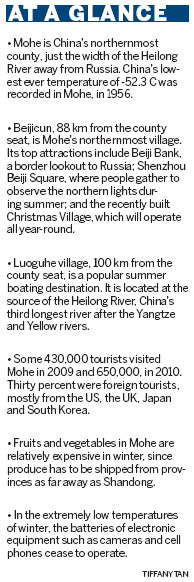
A migrant worker from Inner Mongolia autonomous region, who is married with three grown-up children, Ma shows up at the market every day since she earns just 20 to 40 yuan ($3-6) a day.
"If I don't go to work, my family won't have any money," she says, adding the only time she takes a day off is when the mercury dips below -40 C.
She says life in Mohe is better than farming in her hometown, since she and her husband, a laborer, earn 20,000 yuan ($3,035) a year, or double their former income.
A hundred kilometers away is the village of Luoguhe, a charming collection of snow-covered cottages that signal life through chimney smoke.
It's a popular summer boating destination located at the mouth of the Heilong River, which marks the border with Russia.
Among the village's 200 residents are Wen Mingjia and her husband Wang Yinjue, who own a five-room family inn, which tides them over during winter. In the warmer seasons they farm potato, wheat and soybean.
For a place that received 24-hour electricity only in February 2010, and where running water is still on a schedule, tourists often wonder how Luoguhe can be anyone's residence of choice.
There are no schools in the village, so children have to go to boarding schools in the county seat, at least two hours away by car.
Wen, 36, says she moved here to follow older relatives and because life here was a bit better than in her village hometown off Harbin, the provincial capital.
"The air here is also better," she says.
Mohe produces tough, resilient people and even its tour guides are a special breed.
Zhang Kaiyue, 22, who hails from Jiagedaqi, a town 500 km away, began working as a guide in Mohe in the summer of 2008 because it was the closest tourist attraction to home.
"I was excited by the thought of exploring China's extreme north," she says.
One of the basic responsibilities of a tour guide is to know where the nearest washroom is - and if needed, escort her guests.
But at close to -40 C, in the northernmost village of Beijicun, when you have to trek through inches of snow with leaden feet and even your eyelashes are rimmed with ice, helping a tourist answer the call of nature seems closer to performing a challenge on the Amazing Race.
In winter, when darkness cloaks Mohe by 4 pm, locals usually stay home and entertain themselves by watching TV, surfing the Internet, playing cards or mahjong.
"Lots of people choose to get married in winter," says the tour guide Zhang, in a tone that leaves no room for misunderstanding that the long, bitter-cold season in China's Arctic is an opportunity to linger in bed.
(China Daily 01/06/2011 page19)






